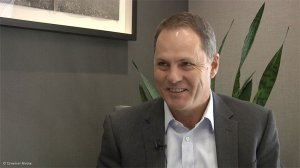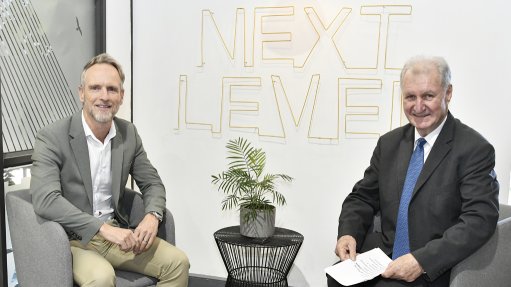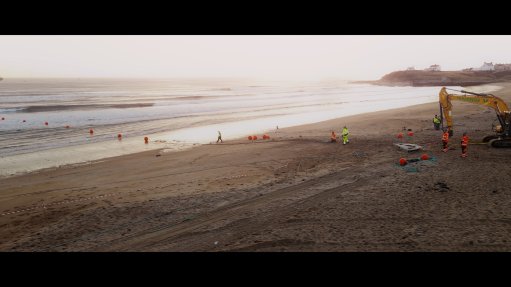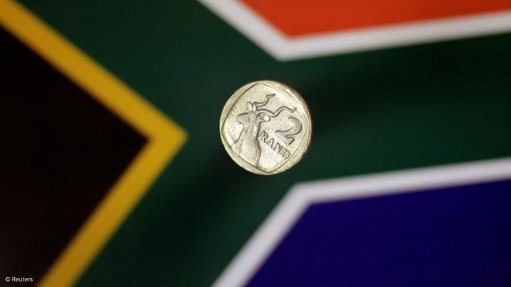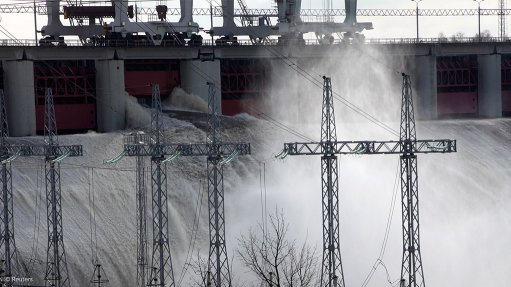Big win for DRDGOLD is 60 MW solar farm as it repositions for future

DRDGOLD CEO Niël Pretorius interviewed by Mining Weekly's Martin Creamer. Video: Creamer Media's Shadwyn Dickinson.
JOHANNESBURG (miningweekly.com) – The big win for surface gold recovery company DRDGOLD is the 60 MW solar farm built at Ergo in the 12 months to June 30.
“I call it a R3-billion prepaid electricity facility that will take care of about half of Ergo’s requirements over the foreseeable future,” DRDGOLD CEO Niël Pretorius commented to Mining Weekly. (Also watch attached Creamer Media video.)
The PV facility at Ergo generated 13 113 650 kWh of energy during the 12 months to July 30, amounting to 10% of consumption. Connection to the Eskom grid has opened the way for the wheeling of excess energy generated at Ergo into the national grid.
The transition to renewable energy use is an integral part of DRDGOLD’s approach to decreasing its environmental footprint, with the proportion of renewable energy used rising, resulting in significant Scope 2 emission reduction.
Simultaneously, major effort has gone into repositioning for the future. Involved is a combination of reclamation sites coming on stream by financial year 2028 to lift tonnage throughput to three-million tonnes a month and gold production to more than six tonnes a year – a rise of one tonne.
The Johannesburg- and New York-listed DRDGOLD reported revenue of R6 239.7-million and total operating profit of R2 081.3-million for the 12 months ended June 30.
A 3% decline in throughput to 22.3-million tonnes and a 2% decrease in the average yield to 0.225 g/t led to a 5% gold production decrease to 5 002 kg
All-in sustaining costs (AISC) rose by 15% to R946 848/kg, with the AISC margin at 24%, and capital expenditure of R2 985.7-million was mostly growth-related.
A final cash dividend of 20c a share for financial year 2024 marked the seventeenth consecutive year of dividend payments to shareholders.
POSITIONING FOR GROWTH
The four Ergo sites where commissioning was delayed are now in steady state, which, along with the commissioning of a fifth site in June, has restored volume capacity to enable delivery in line with the guided throughput target.
Meanwhile, Far West Gold Recoveries Phase II and the establishment of the regional tailings storage facility (RTSF) is advancing.
Once commissioned, the RTSF will be large enough to receive the operation’s entire remaining West Rand resource and provide a solution to the ongoing impact of tailings storage facilities built over environmentally sensitive aquifers in the region.
Groundbreaking at this complex on June 5 follows the appointment of a leading contractor to construct the RTSF.
On the record gold price, Pretorius had this to say: “While the buoyant gold price is welcome, the construct of our cost profile is changing to offer better resilience should the cycle turn.”
Key drivers in this regard include decreasing operational complexity by reducing Ergo’s operating sites from 15 sites to five, lower energy costs from the solar plant, and a reduction in mechanised lifting and haulage of reclamation material.
IMPACT BEYOND MINING
DRD’s model for value creation means that environmental, social and governance factors are central to the business and not simply add-ons.
Every tonne processed supports environmental regeneration and resource renewal, every kilogram produced creates jobs, supports communities and pays taxes.
While DRD’s ethos – doing more with less, and with less impact – makes good business sense, it also has positive environmental and social impacts.
Lower potable water usage and biodiversity are big on its agenda as it reduces historical impacts. Over the past 12 years, more than 138 mine dumps have been removed and reprocessed, and 700 ha of previously sterile land regained for productive use.
Article Enquiry
Email Article
Save Article
Feedback
To advertise email advertising@creamermedia.co.za or click here
Comments
Press Office
Announcements
What's On
Subscribe to improve your user experience...
Option 1 (equivalent of R125 a month):
Receive a weekly copy of Creamer Media's Engineering News & Mining Weekly magazine
(print copy for those in South Africa and e-magazine for those outside of South Africa)
Receive daily email newsletters
Access to full search results
Access archive of magazine back copies
Access to Projects in Progress
Access to ONE Research Report of your choice in PDF format
Option 2 (equivalent of R375 a month):
All benefits from Option 1
PLUS
Access to Creamer Media's Research Channel Africa for ALL Research Reports, in PDF format, on various industrial and mining sectors
including Electricity; Water; Energy Transition; Hydrogen; Roads, Rail and Ports; Coal; Gold; Platinum; Battery Metals; etc.
Already a subscriber?
Forgotten your password?
Receive weekly copy of Creamer Media's Engineering News & Mining Weekly magazine (print copy for those in South Africa and e-magazine for those outside of South Africa)
➕
Recieve daily email newsletters
➕
Access to full search results
➕
Access archive of magazine back copies
➕
Access to Projects in Progress
➕
Access to ONE Research Report of your choice in PDF format
RESEARCH CHANNEL AFRICA
R4500 (equivalent of R375 a month)
SUBSCRIBEAll benefits from Option 1
➕
Access to Creamer Media's Research Channel Africa for ALL Research Reports on various industrial and mining sectors, in PDF format, including on:
Electricity
➕
Water
➕
Energy Transition
➕
Hydrogen
➕
Roads, Rail and Ports
➕
Coal
➕
Gold
➕
Platinum
➕
Battery Metals
➕
etc.
Receive all benefits from Option 1 or Option 2 delivered to numerous people at your company
➕
Multiple User names and Passwords for simultaneous log-ins
➕
Intranet integration access to all in your organisation


